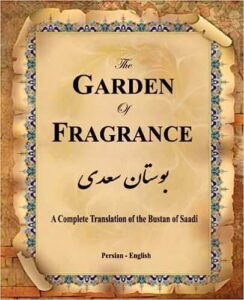“Bustan,” also known as “The Orchard,” is one of the seminal works of Saadi Shiraz, a celebrated Persian poet whose writings have influenced generations. Composed in 1257, this masterpiece of Persian literature offers timeless ethical teachings and profound spiritual insights. This article delves into the structure, themes, and lasting impact of Saadi’s “Bustan.”

Saadi’s “Bustan” is a testament to his deep understanding of human nature and commitment to ethical and moral teachings. Saadi imparts relevant wisdom across centuries through a rich tapestry of poetry and storytelling. The work reflects Saadi’s philosophical and Sufi beliefs, guiding how to live a righteous and meaningful life.
Table of Contents
ToggleStructure of Bustan
Ten Chapters of Ethical Teachings
“Bustan” is divided into ten chapters, each focusing on a different virtue or moral theme. These chapters cover many topics, including justice, generosity, love, humility, and contentment. Saadi employs a variety of literary forms, including anecdotes, parables, and personal reflections, to convey his messages. This structure allows readers to explore ethical teachings comprehensively and engagingly.
Poetic Elegance
Saadi’s use of poetry in “Bustan” enhances the beauty and impact of his teachings. His elegant verses are aesthetically pleasing and memorable, making the lessons they convey more resonant and enduring. Saadi’s poetry’s rhythmic and lyrical quality helps embed the ethical principles into the reader’s mind.
Key Themes in Bustan
Justice and Leadership
The first chapter of “Bustan” focuses on justice and the qualities of a good ruler. Saadi emphasizes the importance of fairness, compassion, and wisdom in leadership. Through stories of kings and their actions, he illustrates how just governance leads to prosperity and harmony while tyranny results in chaos and suffering.
Love and Devotion
In the chapter dedicated to love, Saadi explores both human and divine love. He delves into the transformative power of love and its ability to elevate the human spirit. Saadi’s reflections on divine love highlight his Sufi influences, portraying love as a path to spiritual enlightenment and union with the divine.
Contentment and Simplicity
Saadi advocates for contentment and simplicity as essential virtues for a fulfilling life. He argues that true happiness comes not from material wealth but from a content heart and a simple lifestyle. This theme is particularly evident in his parables that depict the pitfalls of greed and the joy of living modestly.
Generosity and Charity
Generosity is another central theme in “Bustan.” Saadi praises those who give selflessly and criticizes miserly behavior. Through his anecdotes, he demonstrates how charity acts to benefit the recipients and enrich the giver’s soul. According to Saadi, generosity is a means of connecting with others and achieving spiritual growth.
Humility and Patience
Saadi extols the virtues of humility and patience, warning against the dangers of pride and arrogance. He uses stories of humble individuals who achieve greatness and arrogant figures who face downfall to illustrate his points. Saadi’s teachings encourage readers to adopt a humble and patient approach to life, which leads to inner peace and resilience.
Saadi’s Sufi Influence
Spiritual Journey
Saadi’s Sufi beliefs deeply influence the themes and messages in “Bustan.” The work often reflects life as a spiritual journey, where the ultimate goal is to attain closeness to the divine. Saadi’s stories and poems frequently highlight the transient nature of worldly possessions and the eternal value of spiritual wisdom.
Mystical Insights
“Bustan” is replete with mystical insights that reveal Saadi’s profound spiritual understanding. His reflections on the nature of God, the soul, and the universe offer readers a glimpse into the Sufi perspective on existence. Saadi’s ability to blend ethical teachings with mystical wisdom sets “Bustan” apart as a unique literary masterpiece.
Impact and Legacy of Bustan
Educational Value
“Bustan” has been a fundamental part of Persian education for centuries. Its ethical and moral lessons have been used to teach generations of students about virtuous living. The work’s accessibility and engaging style make it an effective tool for imparting wisdom and fostering moral development.
Global Influence
Saadi’s “Bustan” has transcended cultural and linguistic boundaries, influencing literature and thought worldwide. The universal themes of justice, love, generosity, and humility resonate with readers from diverse backgrounds. Translations of “Bustan” have introduced Saadi’s wisdom to a global audience, enhancing its impact and reach.
Modern Relevance
The teachings in “Bustan” remain relevant today, offering guidance on ethical conduct and spiritual growth. In an era of materialism and moral ambiguity, Saadi’s emphasis on virtues such as contentment, humility, and generosity provides a valuable counterbalance. His work inspires individuals to lead lives grounded in ethical principles and spiritual awareness.
FAQs
What is the main message of Saadi’s “Bustan”?
Saadi’s “Bustan” main message is to promote ethical and moral virtues such as justice, love, generosity, and humility. Saadi provides practical wisdom for leading a righteous and fulfilling life through poetic stories and reflections.
How does Saadi’s Sufi background influence “Bustan”?
Saadi’s Sufi background profoundly influences “Bustan,” infusing it with themes of spiritual journey, divine love, and the transient nature of worldly life. His Sufi beliefs shape his ethical teachings and provide a mystical depth to his work.
Why is “Bustan” still relevant today?
“Bustan” remains relevant today due to its timeless ethical teachings and universal themes. In a modern context, Saadi’s emphasis on virtues like contentment, humility, and generosity offers valuable guidance for navigating contemporary moral challenges.
What makes “Bustan” unique in Persian literature?
“Bustan” is unique in Persian literature for its combination of poetic elegance and profound ethical teachings. Saadi’s ability to convey complex moral lessons through engaging stories and beautiful verses sets it apart as a literary masterpiece.
How has “Bustan” influenced global literature?
“Bustan” has influenced global literature by introducing Saadi’s ethical and spiritual insights to a wide audience. Its translations have enriched literary traditions worldwide, highlighting the universal appeal of Saadi’s wisdom.
What are some key themes in “Bustan”?
Key themes in “Bustan” include justice and leadership, love and devotion, contentment and simplicity, generosity and charity, and humility and patience. These themes reflect Saadi’s ethical teachings and his Sufi perspective on life.
Saadi’s “Bustan” remains a timeless treasure of Persian literature, offering profound ethical and spiritual guidance. Its enduring relevance and universal appeal continue to inspire readers worldwide. As we explore the rich tapestry of Saadi’s wisdom, we are reminded of the timeless values that shape a virtuous and meaningful life.







